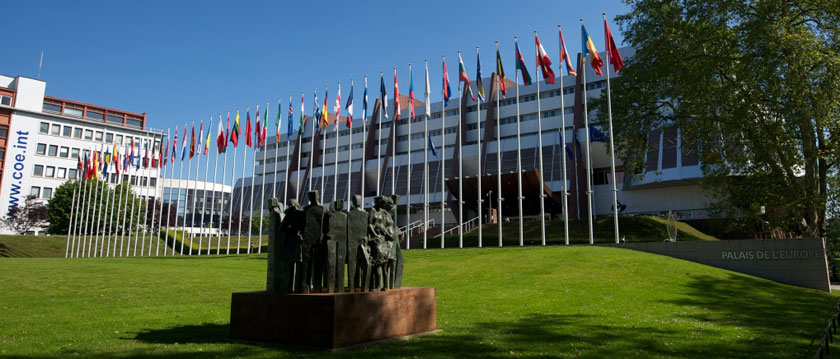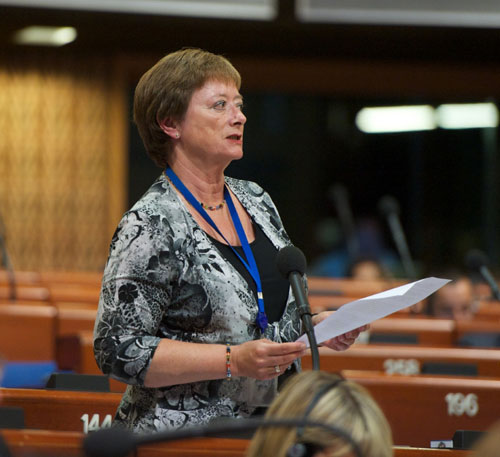
The Council of Europe’s Parliamentary Assembly (PACE) is in Strasbourg from 22nd to 26th June 2015 for its Summer Session. Photo: Council of Europe.
Decisions from PACE’s Summer Session
The Council of Europe’s Parliamentary Assembly (PACE) is currently in Strasbourg for its Summer Session. Two of the most important decisions made so far have been to resolve not to annul the Russian delegation’s credentials and to urge the Azerbaijani authorities to release political prisoners.
In January this year PACE had resolved to impose sanctions against the Russian delegation if no progress could be detected in the conflict in Ukraine. However, on 23rd June the Assembly resolved not to annul the already ratified credentials of the Russian delegation.
The Assembly was unequivocal in its criticism of Russia’s conduct in eastern Ukraine and of its “grave violations” of international law and Ukraine’s sovereign integrity by its annexation of Crimea. However, the majority decision not to annul the Russian delegation’s credentials was a signal of the Assembly’s commitment to maintain PACE as an arena for open and constructive dialogue.
The Russian delegation’s credentials allow it to take part in the work of PACE, but under certain restrictions. It does not have the right to vote in debates, for example.
Release of political prisoners
During the debate on democratic institutions in Azerbaijan, PACE condemned the authorities’ “systematic repression” of civil society that has been taking place in the country over a protracted period of time, and in particular over the past year. The adopted resolution calls on the Azerbaijani authorities to release political prisoners, as well as to publish the names of a handful of prisoners who have cooperated actively with the Council of Europe.

Lise Christoffersen is the deputy head of the Storting’s Delegation to PACE’s Summer Session. Photo: Council of Europe.
«We all had a modicum of hope that the human rights situation in Azerbaijan would improve during the country’s chairmanship of the Council of Europe. Regrettably, the reverse has happened. It’s shocking to discover that people are being imprisoned on false charges simply because they have had meetings with us in Strasbourg. We demand their immediate release,” said Lise Christoffersen (Labour Party), deputy head of the Storting’s Delegation.
Refugees
Earlier during the week, the UN’s Secretary-General Ban Ki-moon raised the issue of the record number of refugees resulting from the many humanitarian catastrophes that the world is currently facing. He underlined the importance of the Council of Europe in this question and urged European countries to take greater responsibility.
Greater protection of whistle-blowers
In another key debate, PACE called for the greater protection of whistle-blowers. The adopted resolution advocated the United States to allow Edward Snowden to return to his home country “without fear of criminal prosecution under conditions that would not allow him to raise the public interest defence”, something he is unable to do as things currently stand.
Read the Summer Session's programme
The Storting’s Delegation to the Parliamentary Assembly of the Council of Europe (PACE) is headed by Ingjerd Schou (Conservative Party), and also comprises the following members: Lise Christoffersen (Deputy Head of Delegation, Labour Party), Frank J. Jenssen (Conservative Party), Morten Wold (Progress Party), Hans Fredrik Grøvan (Christian Democratic Party), Tore Hagebakken (Labour Party), Kristin Ørmen Johnsen (Conservative Party) and Kåre Simensen (Labour Party).
The Council of Europe and PACE
The Council of Europe was founded in 1949 and presently has 47 member states. Its primary objective is to work towards strengthening human rights, democracy and the rule of law in its member states.
The Council of Europe’s Parliamentary Assembly (PACE) brings together 318 representatives (with a corresponding 318 substitute members) from the member states’ parliaments. PACE serves in an advisory capacity and plays an important role in the Council of Europe. It adopts resolutions and makes recommendations to the member states’ parliaments and governments in a high number of different fields. It also monitors how the new member states comply with their membership commitments.
Last updated: 25.06.2015 14:23